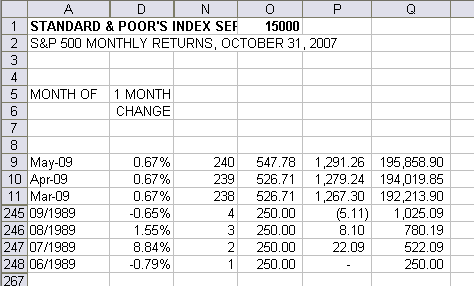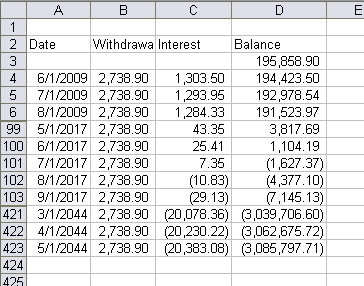The other day J-Walk posted How to Retire at Age 40:
If you were to take 20% of your annual income starting at age 20 and put it in a fund following the S&P 500 Index ($INX), that fund continued to grow at the long-term historical rate (12%) and you received a 4% raise each year, you could walk away from your job and live off the interest at age 41 matching your current salary — or quit at 43 and be able to give yourself a 4% “raise” each year from the interest, which is probably the better plan because it combats inflation. Original Source
Then today, he posted Retirement Revisited which proves out the math.
I’ve been working on this also and wanted to post my results too. Instead of assuming that the S&P 500 returns 12%, I used actual returns and based it on my actual life. Sort of.
I started at Standard & Poor’s – Indices S&P 500 and clicked on the “S&P 500 historical returns” link to download the Excel (xls) file. I don’t remember how much I made when I was 20, but it wasn’t much because I was still in college and had initially ended up succumbing to easy tribal loans for bad credit to pay for some aspects of college. In fact, I think I was a third-year freshman. I turned 20 in June of 1989 and let’s assume I made $15,000 per year. I’ve hid some columns and rows, but here’s the gist of it:

Column D is the monthly return for the S&P 500 for all 240 months between my 20th and 40th birthdays. Since I’m not 40 yet, the last 19 months are the average annual return of the index from June ’89 to October ’07 (7.98638%). That was computed thusly:
The interest rate for 221 months when I start at zero, put $250 per month in, and end at $125,150.57. The $125k is what I get from this worksheet when I don’t increase the monthly pay by 4% and is not shown in the screen shot.
Column N is just a counter showing the month. Column O is the monthly amount saved. The formula in O9 is
$O$1 is the annual salary at age 20. Divided by 12 months. Times 20% savings rate. Increased 4% every 12 months.
Column P shows the interest I earned for the period and column Q is the balance in my investment account.
P: =Q10*D9
Q: =Q10+O9+P9
I’ll have $196k to live on. Let see if it will last.

Nope. If I live until 75, I’ll be $3 million in debt. At age 40, I’m making about $33,000 per year and that’s the standard I need to maintain. If I pull out 1/12 of that every month, I’ll be broke sometime in September of 2017. Damn, the Huskers might be good by then and I won’t have any money to go to the games.
Column B: =MONTHLYRETURNS!$O$1/12*(1.04^20)
Column C: =D3*MONTHLYRETURNS!$D$9 $D$9 is the average return of ~8% per year from the other sheet.
Column D: =D3-B4+C4
It’s not prettied up, by you can download SP500Monthly.zip.
If I live until 75, I’ll be $3 million in debt.
Not a bad strategy, assuming you could actually GET that far in debt.
Or actually live that long. :)
I hate to burst your bubble but you haven’t adjusted your purchasing power for inflation. If you grow income at 4% and inflation grows at least 4% you are standing still or even losing purchase power of your nest egg. You have to increase the rate to include inflation to gain anything. This means if inflation is 4% you have to get 8% salary growth to net 4% real growth. Sorry.
Don’t forget tax. Anyone who can save 20% of their pre-tax income and then earn 12% after income tax, is miraculously lucky. Us ordinary folk will have to work far longer before we retire.
I’m an actuary, and this kind of modelling is what I do all day – and I assure you that there are no miracles, even in compound interest. The cases where compound interest produces amazing results are usually where the investment rate is very optimistic (don’t forget that high return=high risk almost without fail) or where inflation is ignored (making the end value seem much higher than it really is). Basically, saving is hard work!
Dick,
Good post – i have those type of things…
I’m 26 now, how much money do i need to save to retire at 46? – ~30K, dead at 80! :-)
P.S
and do you do loans?
And what about the value of the USD that seems to go down the drain at the moment? It has to come back in the form of increased inflation in the next few years. Everything that comes from abroad is getting very expensive. The only reasons why it has been ‘modest’ so far is because oil is still priced in USD (although some countries already changed that and others are thinking about it) and China has linked their currency to the USD. But the link will be cut off sooner or later. It has already been loosened a little.
Hope I haven’t depressed you ;-)
Rembo
As dermot and others pointed out, the whole thing is bad-assumption-riddled nonsense.
To add to the inflation, gross-net income and tax-on-investment-return problems, we can add fee on the tracker fund (unlikely to be less than 0.5%, which hurts a lot when you let it affect compounding) and a healthy degree of scepticism over that 12% figure. A quick Googling found my figures for the S&P 500 that I can only get to 10.5% or so since 1960.
I hope the guy who wrote the article got well-paid – he’s probably the only one who’s get to get much out of it.
Dick
Please do not take all of this as a joke or just a complement I am 70% serious: –
Your writing is very nice. You can make a living as writer have you ever thought to try it? You would have some success in light entertaining stories, funny stories.
In the meantime you can continue this blog although my level is just at infancy level and I do not understand much of the contribution I enjoy reading them.
Regards
Eddie
PS I passed a similar advice/judgement to a young man he is a journalistnow in Time Out now.
I compared a tradesmen and a college grad lifetime finances a while ago.
I think the college kid caught up with the joiner in their mid forties (using UK education costs).
That was based on simple cumulative earnings – I should maybe update for time value. I think that will make the trades even more appealing.
I revisited this posting now that the S&P 500 has dropped to its 1997 level, but the link to the Excel file is broken.
It would be interesting to see how long the money would last given a 0% average return for the last 11 years.
Fixed. Thanks.